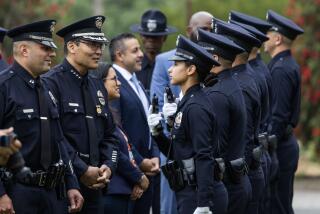New Gun Laws, Aggressive Enforcement Should Work Together
- Share via
The National Rifle Assn., confronted with strong public support for laws making it harder for criminals and minors to obtain guns, is telling Congress that “America doesn’t need new [gun] laws” because the “laws we already have . . . aren’t being enforced.”
This argument, overstated at best, shouldn’t dissuade us from enacting thoughtful new firearm policies. Nevertheless, it would be a mistake to dismiss the challenge to enforce gun laws as aggressively as possible. Laws only change society when they’re backed by robust enforcement. Without it, they’re merely words on paper.
The debate over gun enforcement heated up this summer when a Syracuse University study reported that the number of weapons cases referred for prosecution by the Federal Bureau of Alcohol, Tobacco and Firearms fell 44% between 1992 and 1998. In California, federal charges appeared to decline an even greater 53%.
Ineffective enforcement? Not exactly. Although exploited by gun control opponents, the Syracuse study was flawed by incomplete statistics. Federal firearm charges actually dropped only 17% nationally, according to the U.S. Department of Justice. That relatively small decline is partly because defendants can now face longer terms if charged under state “three strikes” statutes rather than under federal law. Total state and federal gun charges brought in California since 1992 actually have increased significantly.
However, there’s no denying a shortage of resources to investigate and prosecute gun violators. For instance, the Syracuse study showed the number of criminal investigators at ATF had declined 14% in seven years.
Ironically, it is the NRA itself that has long stood in the way of the agency’s work. ATF has been hemmed in by NRA-sponsored legislation limiting inspections of gun dealers, and defamed by the organization’s propaganda machine that labeled federal law enforcers “jack-booted thugs.”
In Los Angeles, recent increases in the ranks of the LAPD’s gun unit have helped, but investigators who target firearms trafficking still report a “lifetime worth of leads” to follow up.
Gun-tracing and data-sharing systems among federal, state and local agencies could be enhanced: Incompatibility between FBI and ATF tracing systems diminishes the odds of linking guns, bullets or shells to specific crimes and suspects.
In addition, trace reports still move from federal to local agencies on paper, not electronically, and there is no centralized crime gun database. As a result, it’s difficult for investigators to see patterns of firearm trafficking. Law enforcers and prosecutors are trying hard to resolve these resource issues while at the same time developing new alliances and strategies to reduce gun violence.
U.S. Atty. Alejandro Mayorkas has announced plans to increase the kinds of firearm cases his office prosecutes, and is forming closer ties with local officials to handle gun cases cooperatively. California Atty. Gen. Bill Lockyer, only weeks into his new administration, revamped Department of Justice computer systems to help the city of Los Angeles enforce its new anti-trafficking law that prohibits multiple-handgun transactions. He subsequently created a Firearms Division that will focus state gun enforcement efforts.
The county is attempting to reduce illegal firearms sales by curtailing gun shows, and Sheriff Lee Baca is creating a gun unit, similar to the LAPD’s, that will centralize activities now scattered across his giant department.
Through the Community Law Enforcement and Recovery program, City Atty. Jim Hahn and Dist. Atty. Gil Garcetti are coordinating city and county enforcement, with a special emphasis on gun crimes. Meanwhile, under a federal grant, LAPD’s Hollenbeck Division is working with Rand Corp., the Santa Monica-based think tank, to replicate the successful Boston Gun Project, a team effort by Harvard researchers and Boston police that has drastically reduced youth homicides.
*
These are a few of the initiatives to be discussed Monday at City Hall where the Southern California Gun Law Enforcement Conference will take place. The event, open to the public, will bring together top law enforcement officers, prosecutors and elected officials from every level of government to wrestle with issues such as the need for better cooperation, technology and the persistent shortage of resources.
We’ve made progress against gun violence in recent years, but the bloodshed remains epidemic. More than 1,000 residents of Los Angeles County were killed by guns last year. It’s time to move beyond the false debate about whether guns or people are to blame. Guns in the hands of the wrong people are what kill, and the problem must be attacked from every direction.
As progressive legislators attempt to address these issues with new laws, there’s one valid lesson we can learn from the hyperbole of gun law opponents: New gun policies are futile without effective enforcement.
More to Read
Get the L.A. Times Politics newsletter
Deeply reported insights into legislation, politics and policy from Sacramento, Washington and beyond. In your inbox twice per week.
You may occasionally receive promotional content from the Los Angeles Times.










